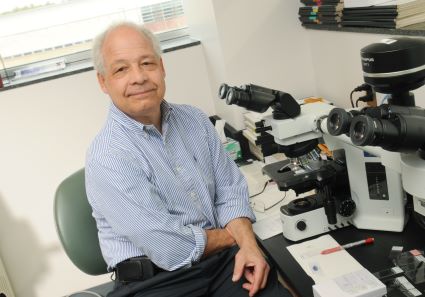Mason COVID antibody testing shows a lot of promise in the body’s ability to fight the virus
John Hollis
Mon, 03/01/2021 – 16:10
COVID-19 antibody research by Lance Liotta and his team has shown the human immune system is better able to fight the virus than initially believed. Photo by Evan Cantwell/Creative Services
George Mason University researchers say their study of COVID-19 antibodies in people previously been infected with the virus reveals the human immune system’s strong ability to fight the virus, even if they showed minimal or no symptoms. Additional early results are showing that the vaccines being rolled out to combat the global pandemic generate a strong immune response.
Lance Liotta, the co-director, co-founder and medical director of the Center for Applied Proteomics and Molecular Medicine (CAPMM) within Mason’s College of Science, and his colleagues are using an improved COVID-19 antibody test developed as part of a Mason clinical study to measure the body’s response to the vaccine.
Based on months of study of patients who were naturally infected, Liotta and his team were able to verify that patients’ antibodies lasted longer than initially first believed and that they potentially helped prevent those patients from getting sick again. Early results of those who have been vaccinated have confirmed the shots to be strong boosters to the human immune system’s ability to combat the virus by generating more antibodies that block the virus spike protein tips. Tips of the spikes are the starting point for the virus to enter the patient’s cells.
“This research offers truth and hope,” Liotta said. “The public is anxious and very worried about the virus. They want to know if the vaccines work. They want to know if the antibodies made by the body after a natural infection or after a vaccine will actively work to fight the virus. If I do get sick, can these antibodies help me?
“The answer is yes.”
That welcome revelation could be key in lessening the chance for severe sickness and limiting the spread of the virus.
“Nevertheless we can’t let down our guard, and we must maintain social distancing and mask wearing practices that has protected our students and staff so well,” said Julie Zobel, Mason’s assistant vice president for Safety, Emergency and Enterprise Risk Management.
Additionally, the expanded antibody research is providing scientists new clues about devising treatments for COVID-19, Liotta said, because of the many ways each of the different antibodies combat the virus.
“We are humbled at how good the immune system is at fighting this,” Liotta said.
Liotta and his team began their initial COVID-19 antibody study at the start of the global pandemic last spring. The testing allows scientists see how the body recognizes and reacts to the virus, particularly important when it comes to asymptomatic cases.
“[Some of the subject tested] never knew that they had contracted COVID,” Liotta said, “but we can tell by looking at the antibodies that exist in their body. That’s a very important piece of information.”
Antibodies, which are Y-shaped proteins generated by the immune system’s white blood cells, could prove critical in the fight against COVID-19. They attach to antigens much like a key to a lock to destroy invading germs. Once exposed to the virus, the body creates memory cells that will henceforth recognize the invader and spur the immune system to create antibodies to fight it in the future. So having antibodies to COVID-19 could possibly prevent people from becoming infected with the virus again.
The aim of COVID-19 vaccinations is to stimulate a similar antibody response that would provide that protection from the virus. Liotta’s team of internationally recognized experts in diagnostic testing includes colleagues Virginia Espina, the research professor who oversees the Center for Applied Proteomics and Molecular Medicine’s CAP/CLIA certified laboratories, and Alessandra Luchini, the associate professor overseeing the development of the laboratory antibody assay in the nanotechnology lab. They will collectively use their expertise in clinical laboratory medicine, biochemistry, bioinformatics, molecular biology and infectious diseases to confirm those antibody responses.
“Mason has been on the forefront of COVID research,” Espina said. “Since March, we have been working on different aspects of COVID research, and [Mason has been] very responsive to testing and keeping the campus community safe. We have done a wonderful job as a university in being able to keep the university open, prevent layoffs and allow students to come back onto campus.”

